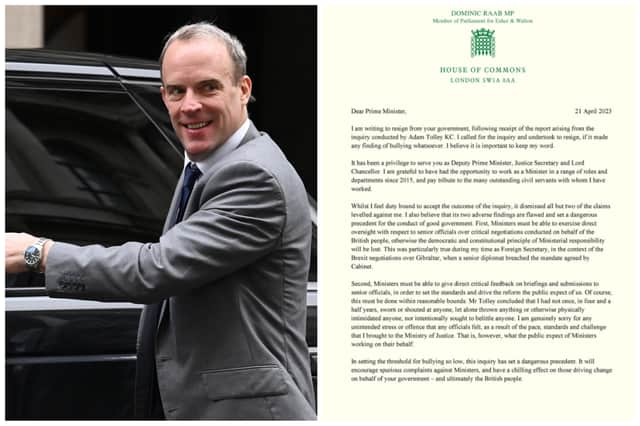Dominic Raab’s resignation statement in full: what he said and what he meant


After almost 24 hours of delay, Dominic Raab has gone. The deputy prime minister posted his resignation statement at 9.48am, and it was an absolutely classic example of the "non-apology apology" genre.
Here we run through what the now former Justice Secretary said in his statement, and what he (probably) meant.
Advertisement
Hide AdAdvertisement
Hide AdWhat he said: “I am writing to resign from your government, following receipt of the report arising from the inquiry conducted by Adam Tolley KC. I called for the inquiry and undertook to resign, if it made any finding of bullying whatsoever. I believe it is important to keep my word. It has been a privilege to serve you as Deputy Prime Minister, Justice Secretary and Lord Chancellor. I am grateful to have had the opportunity to work as a minister in a range of roles and departments since 2015, and pay tribute to the many outstanding civil servants with whom I have worked.
What he meant: “I suppose I’d better do what I said I’d do, now that some of these trouble-making, lefty mandarins have kicked up enough of a stink.”
What he said: “Whilst I feel duty bound to accept the outcome of the inquiry, it dismissed all but two of the claims levelled against me. I also believe that its two adverse findings are flawed and set a dangerous precedent for the conduct of good government. First, ministers must be able to exercise direct oversight with respect to senior officials over critical negotiations conducted on behalf of the British people, otherwise the democratic and constitutional principle of ministerial responsibility will be lost. This was particularly true during my time as Foreign Secretary, in the context of the Brexit negotiations over Gibraltar, when a senior diplomat breached the mandate agreed by Cabinet.
What he meant: “That's practically an exoneration isn't it? All but two! Anyway, I really really don’t accept the outcome of the inquiry. How can ministers like me do our jobs if we’re not allowed to heap extreme pressure on civil servants and push them to breaking point on a daily basis? That’s what good government is all about surely.”
What he said: “Second, ministers must be able to give direct critical feedback on briefings and submissions to senior officials, in order to set the standards and drive the reform the public expect of us. Of course, this must be done within reasonable bounds. Mr Tolley concluded that I had not once, in four and a half years, sworn or shouted at anyone, let alone thrown anything or otherwise physically intimidated anyone, nor intentionally sought to belittle anyone. I am genuinely sorry for any unintended stress or offence that any officials felt, as a result of the pace, standards and challenge that I brought to the Ministry of Justice. That is, however, what the public expect of ministers working on their behalf.
What he meant: “I suppose I’m sorry if the snowflakes in the Ministry of Justice couldn’t handle the sheer speed and blinding ability of an elite operator like me. If they can’t stand the heat perhaps they should get out of the kitchen.”
What he said: “In setting the threshold for bullying so low, this inquiry has set a dangerous precedent. It will encourage spurious complaints against ministers, and have a chilling effect on those driving change on behalf of your government — and ultimately the British people.”
What he meant: “Because of this inquiry, Westminster is in danger of becoming a workplace culture that has to conform to all the norms of the 21st century, where it’s apparently not OK to put people under ridiculous levels of pressure and stress. What kind of place would that be? It would spell the tragic end of countless careers like my own.”
Advertisement
Hide AdAdvertisement
Hide AdWhat he said: “Finally, I raised with you a number of improprieties that came to light during the course of this inquiry. They include the systematic leaking of skewed and fabricated claims to the media in breach of the rules of the inquiry and the Civil Service Code of Conduct, and the coercive removal by a senior official of dedicated private secretaries from my Ministry of Justice private office, in October of last year. I hope these will be independently reviewed.”
What he meant: “Let me just add some allegations to the mix so it makes me look like the victim. Brazen, sure, but why not. I am a lawyer after all.”
What he said: “I remain as supportive of you and this government, as when I first introduced you at your campaign leadership launch last July. You have proved a great Prime Minister in very challenging times, and you can count on my support from the backbenches.”
From our sister title PeopleWorld: Who is Erika Rey? Dominic Raab's wife in profile
Comment Guidelines
National World encourages reader discussion on our stories. User feedback, insights and back-and-forth exchanges add a rich layer of context to reporting. Please review our Community Guidelines before commenting.
